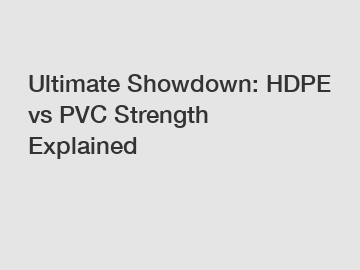Ultimate Showdown: HDPE vs PVC Strength Explained
Ultimate Showdown: HDPE vs PVC Strength Explained: Which Material Reigns Supreme?
When it comes to choosing the right material for your construction or piping projects, HDPE (High-Density Polyethylene) and PVC (Polyvinyl Chloride) are two popular contenders. Both materials possess unique characteristics that make them suitable for various applications. However, their strength capabilities are often a primary consideration for decision-making. In this article, we will delve into the strength factors of HDPE and PVC, highlighting their similarities and differences to determine which material truly reigns supreme.
1. HDPE Strength Explained:

HDPE is renowned for its impressive strength and durability. This material excels in various settings, including water supply lines, drainage systems, and even geothermal piping. HDPE's high tensile strength allows it to withstand significant internal and external pressure, making it ideal for underground installations. Additionally, HDPE has a remarkable resistance to corrosion, chemicals, and even extreme weather conditions, ensuring longevity in various environments.
2. PVC Strength Explained:
PVC, on the other hand, also possesses notable strength characteristics. It is commonly used in plumbing, irrigation, and electrical conduit applications. PVC pipes have a high impact strength, enabling them to resist cracks or breaks caused by external forces. They are lightweight yet sturdy, making them easy to install and transport. However, it is crucial to note that PVC pipes may become more brittle over time and can be prone to damage under freezing conditions.
3. Comparative Strength Analysis:
When comparing HDPE and PVC strength, it is important to consider their respective strengths under different circumstances. In terms of pressure resistance, HDPE outperforms PVC due to its superior tensile strength. HDPE is significantly less likely to experience failure or leakage, even at high pressures. PVC, although reasonably strong, may be prone to cracks or breaks under excessive sustained pressure.
4. Durability Consideration:
Durability is a crucial aspect when assessing the strength capabilities of materials. HDPE's resistance to corrosion, chemicals, and extreme weather conditions ensures its longevity and reduces the need for frequent repairs or replacements. PVC, although durable, may require more maintenance and attention to prevent potential damage from chemical exposure or adverse weather conditions.
5. Environmental Factors:
Another essential factor to consider is the impact of the material on the environment. HDPE is considered more environmentally friendly than PVC due to its recyclability. While PVC can be recycled to some extent, the process is more complex and less widely implemented. Additionally, HDPE does not release harmful chemicals during its lifespan, providing a safer choice for drinking water or environmentally sensitive applications.
6. Cost Comparison:
Cost is often a determining factor in material selection. HDPE pipes tend to be more expensive initially due to the higher cost of the raw material and the manufacturing process. However, the long-term benefits of HDPE's durability, reduced maintenance, and extended lifespan often offset the initial investment. PVC's lower upfront cost may make it an attractive choice for some projects, but the potential for higher maintenance and replacement costs should also be considered.
In conclusion, while both HDPE and PVC exhibit considerable strength capabilities, HDPE emerges as the clear winner in terms of sheer strength and durability. Its high tensile strength, corrosion resistance, and ability to withstand extreme conditions make it the optimal choice for various applications, including water supply lines, drainage systems, and underground installations. Moreover, HDPE's recyclability and environmentally friendly nature further enhance its appeal. Although PVC has its advantages and is suitable for certain projects, HDPE's overall strength and long-term cost-effectiveness make it the premier option for those prioritizing durability and reliability in their constructions. So, when it comes to the ultimate showdown between HDPE and PVC strength, HDPE takes the crown.
For more hdpe floats, hdpe pipe vs pvc, floater pipeinformation, please contact us. We will provide professional answers.

Comments
0